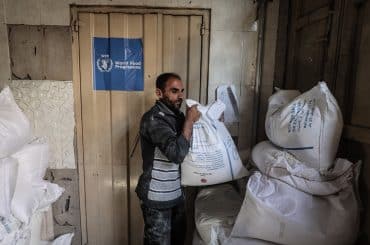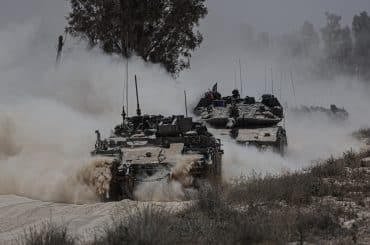This afternoon, at the International Court of Justice in The Hague, lawyers for South Africa took another crack at obtaining a court-ordered halt to Israel’s military assault on Rafah and its entire genocidal war on Gaza.
The situation couldn’t be more urgent, South Africa stated in its May 10 application to the top UN court, triggering two days of hearings, that began today.
Israel will present counter arguments tomorrow.
“The onslaught on the Palestinians in Gaza is of a nature that can only be intended to result in the genocidal destruction of that group,” South Africa’s application states.
“In attacking Rafah, Israel is attacking the “last refuge” in Gaza, and the only remaining area of the Strip which has not yet been substantially destroyed by Israel. With Rafah’s destruction, the destruction of Gaza itself will be complete.”
Standing before the court’s fifteen judges this afternoon, British attorney Vaughan Lowe delivered a withering and impassioned case for a strict, court-ordered halt to Israel’s war on Gaza.
“[It] has become increasingly clear that Israel’s actions in Rafah are part of the endgame in which Gaza is utterly destroyed as an area capable of human habitation. This is the last step in the destruction of Gaza and its Palestinian people.”
Vaughan Lowe
“[The] evidence has to be faced,” Vaughan said – “evidence of continued bombings, attacks on people in so-called safe areas to which they’ve been directed by Israel, attacks on aid convoys and of mass graves and the horrors of which the corpses speak.”
“[It] has become increasingly clear that Israel’s actions in Rafah are part of the endgame in which Gaza is utterly destroyed as an area capable of human habitation,” Lowe said. “This is the last step in the destruction of Gaza and its Palestinian people.”
Lowe dismissed Israeli arguments, and those of its allies, that Israel is acting in self-defense.
“No right of self-defense can ever extend to a right to inflict massive, indiscriminate violence and starvation collectively on an entire people,” Lowe told the court. “Nothing – not self-defense or anything else – can ever justify genocide.”
And, said Lowe, citing the ICJ’s 2004 ruling on Israel’s Apartheid Wall, “there is no right of self-defense by an occupying state against the territory that it occupies.”
“The key point today is that Israel’s declared aim of wiping Gaza from the map is about to be realized,” Lowe added. “Further evidence of appalling crimes and atrocities is literally being destroyed and bulldozed, in effect wiping the slate clean for those who’ve committed these crimes and making a mockery of justice.”

Court-ordered halt to Israel’s campaign
South Africa’s May 10 application to the ICJ, and today’s presentation by its five-member legal team, was its fourth attempt at securing an order from the court, compelling Israel to suspend its military assault, now into its eighth month.
On January 26, in response to South Africa’s original application to the court, the ICJ ‘indicated’ a half-dozen provisional measures for Israel to undertake. A suspension in its military operations was not one of them.
Instead, Israel was instructed to “take all measures within its power” to prevent genocide in Gaza, as genocide is defined under the 1948 Convention; to ensure that its military doesn’t commit genocidal acts; to prevent and punish genocide rhetoric and incitement; to ensure the provision of basic services and humanitarian assistance to Gaza; to prevent the destruction of and preserve evidence, and to submit a report to the court within a month of the ruling.
Two weeks prior to Israel’s report (which was not made public), on February 12, South Africa submitted a second “urgent” request for additional provisional measures, including an order to stop the war. The court responded on February 16, declining to do so.
Instead, citing the UN Secretary General’s comments that developments in the Gaza Strip, and in Rafah in particular, “would exponentially increase what is already a humanitarian nightmare with untold regional consequences,” the Court reiterated Israel’s obligation to comply with its obligations under the Genocide Convention and to ensure the “safety and security” of Palestinians in the Gaza Strip.
On March 6, with the situation worsening, and Gaza poised on the brink of famine, South Africa tried a third time. The Court responded on March 28. In a unanimous ruling, it declared that the situation was now “exceptionally grave,” and instructed Israel to ensure the “unhindered provision,” at scale, of food, water, electricity, fuel, shelter, clothing, hygiene, and medical supplies throughout Gaza.
By a vote of 15-1, the ICJ also instructed Israel to ensure that its military “does not commit acts which constitute a violation of any of the rights of the Palestinians in Gaza as a protected group under the Convention on the Prevention and Punishment of the Crime of Genocide, including by preventing, through any action, the delivery of urgently needed humanitarian assistance.”
Israel has failed to comply with any of the ICJ’s orders to date, South Africa told the court today, and it’s time to take off the kid gloves.
“Israel’s conduct has been contemptuous of the Court and of international law,” South Africa said in its May 10 application. “The provisional measures indicated by the Court to date have been ignored and violated. Israel has instead chosen to escalate the humanitarian catastrophe through total military onslaught.”
“If the court does not act now, the possibility of rebuilding a viable Palestinian society in Gaza will be destroyed, at least for the lifetime of those who survived the current horrors of Gaza.”
Vaughan Lowe
“[The] essential point,” Vaughan Lowe told the ICJ this morning, “is that the court has the power to act to ensure that its previous orders and its eventual judgment will not be worthless, and that the Palestinian people will be protected, and that it needs to exercise that power now … If the court does not act now, the possibility of rebuilding a viable Palestinian society in Gaza will be destroyed, at least for the lifetime of those who survived the current horrors of Gaza.”
In its May 10 application — expanded on this afternoon in The Hague — South Africa asked the court to issue an “explicit order” to Israel to terminate its military campaign in Rafah and Gaza more broadly and to ensure and facilitate the flow of humanitarian aid and assistance.
In response to fears of evidence destruction and “effective erasure of the possibility of bringing those responsible to justice,” South Africa also asked the court to order Israel to ensure safe access for fact-finding missions, investigators, and journalists.
Provisional measures orders are binding, in principle, but the Court has no means to enforce them.
“Israel has defied every single provisional measure indicated by this court in its orders of the 26 January and the 28 March and in its decision of the 16 February,” South African attorney Adila Hassim told the court this afternoon.
“Israel has the power over each and every Palestinian man, woman, and child in Gaza to determine if they live or how they die,” Hassim told the court. “History warns us what happens next. We cannot simply stand by waiting for that to happen again.”
Hassim rattled off numbers:
At least 35,000 Palestinians killed and 79,000 injured since October 7, with 10,000 more reportedly missing or under the rubble; up to 1.7 million displaced, most of them on multiple occasions; seventy percent of Gaza’s housing stock reduced to rubble.
Since its January 11 presentation to the court, Hassim said, at least 11,500 more Palestinians have been killed, the majority of them women and children.
“Gaza’s children have suffered particularly severely,” Hassim said this afternoon, struggling to compose herself. Fourteen thousand children have been killed — “two mothers and four children killed every hour.”
And, Hassim said, “an estimated 17,000 children are unaccompanied or separated. Nearly all of Gaza’s children have been exposed to traumatic experiences, the consequences of which will last a lifetime.”
“Make no mistake,” said Hassim, “these conditions are a direct result of Israel’s military onslaught on the besieged enclave, with full knowledge of the destructive consequences of this humanitarian crisis … the thwarting of humanitarian aid cannot be seen as anything but the deliberate snuffing out of Palestinian lives.”
Citing a host of UN and media reports, South Africa’s application lays out the situation Gazans face in harrowing detail: the uncovering of mass graves at Al-Nasser hospital, described in gruesome detail by Hassim; Israel’s use of AI-generated “kill lists”; the over half-million children sheltering in Rafah, “many of them disabled, orphaned or alone,” forced to flee down evacuation corridors littered with unexploded ordnance and possibly land mines, along with thousands of pregnant women and countless others.
More atrocious crimes may soon be in store, South Africa told the court today.
“Israel’s practice of separating Palestinian men from women and children as they attempt to flee along purported “safe routes” is reminiscent of the genocidal practices at Srebrenica,” South Africa told the court in its May 10 application, citing a May 7 Open Letter from Al-Haq, Al Mezan and Palestinian Centre for Human Rights.
Lending credence to such a dark warning, South African lawyers cite social media posts by Israeli soldiers about “extermination zones,” and how Israeli troops have fired directly on displaced Palestinians in tent encampments.
As soldiers chatter on Telegram and X, so do senior Israeli leaders and politicians in open forums, South Africa told the court, quoting them.
Israel is “taking [Gaza] apart neighborhood after neighborhood,” Defense Minister Yoav Gallant declared on March 3.
“[There] are no half measures,” stated the ever-candid Bezalel Smotrich on April 29, citing the Torah, and quoted in Ha’aretz. “Rafah, Deir al-Balah, Nuseirat — total annihilation. ‘You shall blot out the remembrance of Amalek from under heaven’ — there’s no place under heaven.”
“There are no uninvolved [civilians in Rafah],” the vice chair of the international arm of Benjamin Netanyahu’s Likud Party, Shimon Boker, insisted on Israeli TV on May 3. ”[We] to go in and kill and kill and kill … We have to kill them before they kill us.”
Genocidal rhetoric is widespread across Israeli society, and in the Israeli military, South African attorney Tembeka Ngcukaitobi told the court. “Let’s go and destroy Gaza,” soldiers shout ecstatically in video Ngcukaitobi shared with the court.
Ngcukaitobi referred at length to Brigadier General Dado Bar Kalifa, commander of Israel military’s 36th Division. Kalifa, Ngcukaitobi told the court, had issued a letter to soldiers preparing to deploy in Gaza.
“What has been will be no more,” Kalifa had said. “We shall go out to it in war. We shall pulverize every accursed plot of land from which it came. We shall destroy it and the memory of it.”
Far from punishing Kalifa for his genocidal comments, pursuant to past provisional measures from the court, the IDF was promoted, and tapped to lead the IDF’s personnel division.
Similarly, said Ngcukaitobi, when 130 senior officers called on Israel’s war cabinet to not allow humanitarian supplies and the operation of hospitals in Gaza, they were not charged with incitement or prosecuted.
ICJ response
The ICJ’s decision to hold hearings, within days of South Africa’s May 10 request, is unprecedented. Given its haste in doing so, it may likely accede to South Africa’s request for an order to halt the war.
Israel will present tomorrow. It has not responded in writing to South Africa’s May 10 submission.



The court must decide whether the genocide convention is about prevention. Israel has been emboldened in part by this court’s apathy to its criminal behaviour. If the ICJ does not act it will be anlongside Israel in the history books.
Sure looking like the ICJ is essentially complicit. Weak kneed words is all that is coming out of these hearings.
Israel’s massacre of Palestinians and destruction of Gaza’s infrastructure continues.
Palestinian children who have survived Israel’s massacre do so without limbs.
https://www.cnn.com/videos/tv/2024/05/15/amanpour-karadsheh.cnn
The Israeli reply :
https://www.youtube.com/watch?v=XkVQFbUng0I&ab_channel=AssociatedPress